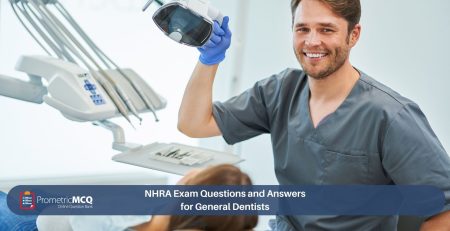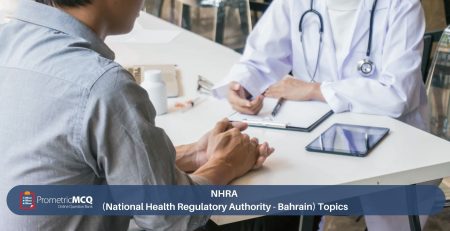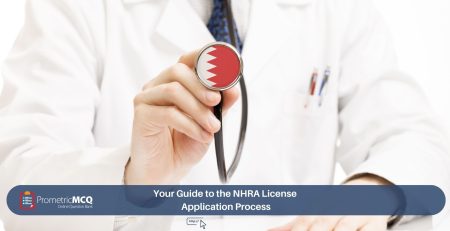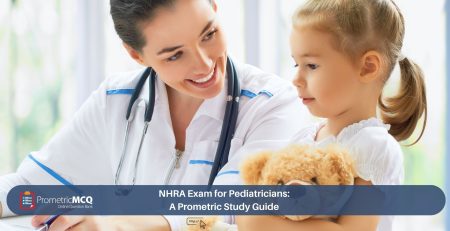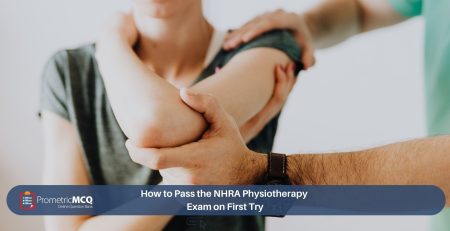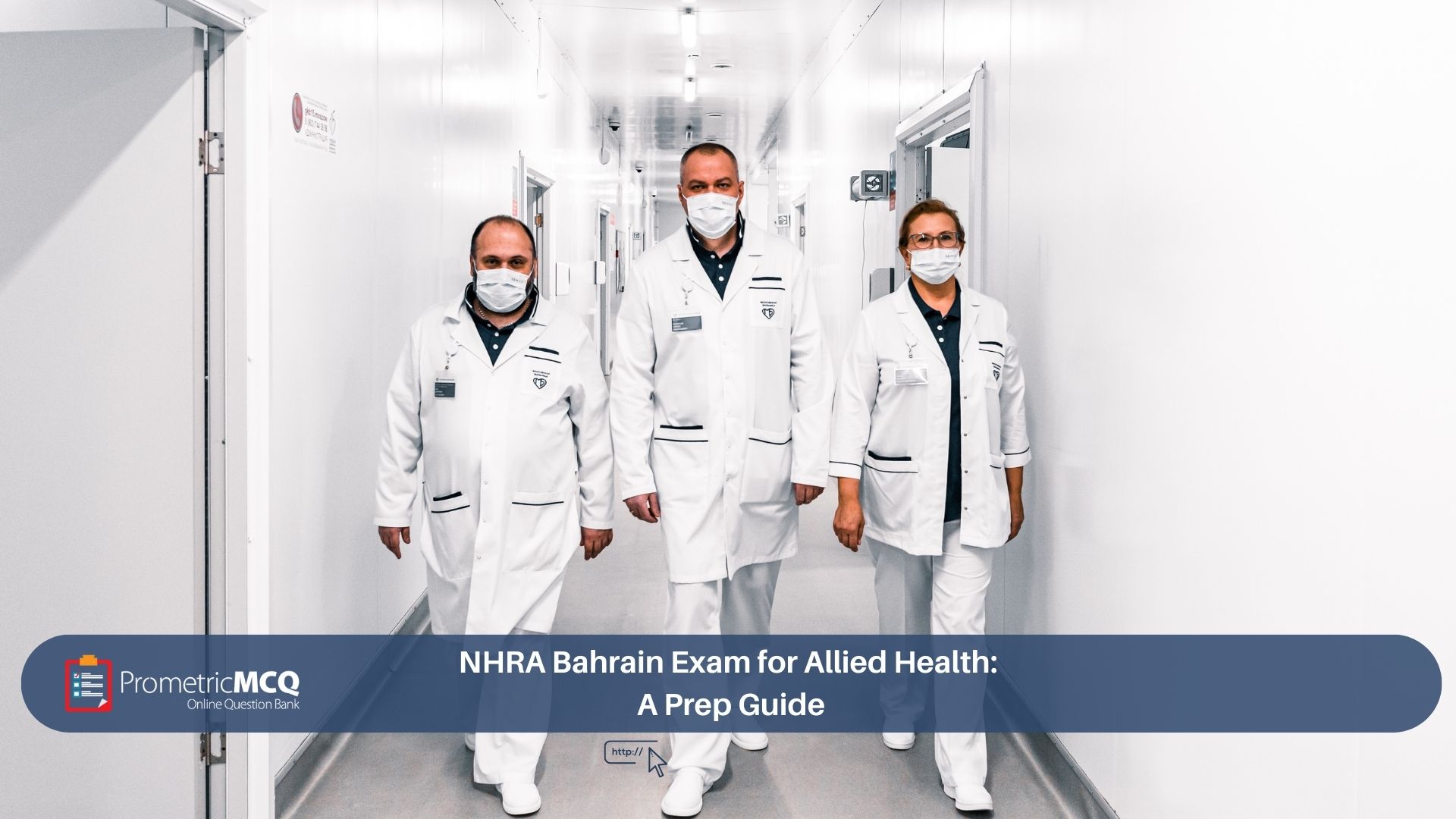
NHRA Bahrain Exam for Allied Health: A Prep Guide
fatima@prometricmcq.com2025-09-19T02:01:21+00:00Table of Contents
ToggleNHRA Bahrain Exam for Allied Health: A Prep Guide (2025)
The Allied Health professions form the backbone of modern healthcare, providing essential diagnostic, therapeutic, and support services. In the Kingdom of Bahrain’s sophisticated medical landscape, the demand for highly skilled Allied Health Professionals—from physiotherapists and medical laboratory technicians to radiographers and dietitians—is immense. To ensure the highest standards of patient care, the National Health Regulatory Authority (NHRA) requires all practitioners to pass a rigorous licensure exam, a critical step towards a rewarding career in the Kingdom.
Unlike the exams for doctors or nurses, the Allied Health examinations are incredibly diverse, each tailored to the specific technical skills and clinical knowledge of a particular discipline. Yet, they all share a common purpose: to verify that a professional possesses the core competencies to practice safely and effectively. Navigating the preparation for these specialized exams can be a daunting task, requiring a focused, discipline-specific study strategy.
This ultimate 2025 guide is your comprehensive blueprint for conquering the NHRA Bahrain exam for all major Allied Health professions. We will break down the universal exam pattern and then provide a deep dive into the specific syllabi, question styles, and high-yield topics for Physiotherapy, Medical Laboratory Science, Radiography, Occupational Therapy, and Dietetics. Complete with a detailed 10-point FAQ and strategic advice, this guide aims to provide the clarity and direction needed for a successful first-time pass.
Key Takeaways for Allied Health Exam Success
- Discipline-Specific Focus: Your preparation must be tailored to the unique syllabus and competencies of your specific profession.
- Technical Proficiency is Key: Expect a strong emphasis on procedures, equipment, safety protocols, and quality control relevant to your field.
- Clinical Application Matters: The exam uses case-based scenarios to test your ability to apply theoretical knowledge to real-world patient situations.
- Safety First, Always: From radiation protection to laboratory safety and patient handling, questions will constantly assess your commitment to safe practice.
- MCQ Practice is Essential: The most effective way to prepare is by engaging with a high-quality question bank tailored to your Allied Health specialty.
The NHRA Allied Health Exam: A Universal Framework
While the content is highly specialized, the exam’s structure is standardized across all Allied Health professions. Understanding this framework is the first step in your Bahrain NHRA exam preparation.
- Administrator: Prometric
- Format: Computer-Based Test (CBT) with 100% Multiple-Choice Questions (MCQs).
- Structure: Typically 150 questions in 3 hours (180 minutes).
- Scoring: Pass/Fail result, with no negative marking. The estimated passing score is generally 55-60%.
This standardized format means that regardless of your specialty, time management and proficiency with the MCQ format are universal keys to success. For a complete overview of the exam structure, please see our detailed guide on the NHRA Exam Pattern for All Professions.
Deep Dive: Exam Blueprint by Allied Health Specialization
Here, we explore the specific high-yield topics and expected question styles for the major Allied Health disciplines.
1. Physiotherapy
- Core Focus: Assessment, diagnosis, and management of musculoskeletal, neurological, and cardiopulmonary conditions.
- Syllabus Emphasis: – Musculoskeletal: This is the largest section. Master orthopedic special tests (Lachman’s, Hawkins-Kennedy, etc.), joint mobilization grades, and post-operative rehab protocols (ACL, TKR, THR). – Neurology: Focus on stroke, SCI, TBI, and Parkinson’s. Know your assessment scales (Berg, Ashworth), PNF techniques, and principles of motor learning. – Cardiopulmonary: Understand MET levels, Borg scale, airway clearance techniques, and cardiac rehab phases.
- Question Style: Expect case vignettes describing a patient’s presentation, asking for the most likely diagnosis, the most appropriate special test, or the best initial intervention.
- Recommended QBank: Physiotherapy MCQs
2. Medical Laboratory Technician / Technologist
- Core Focus: Analytical procedures, quality control, laboratory safety, and the correlation of lab results with disease states.
- Syllabus Emphasis: – Hematology: CBC interpretation, blood film morphology, coagulation studies (PT/APTT). – Microbiology: Specimen collection, bacterial identification (Gram stain, culture), and basic parasitology/mycology. – Clinical Chemistry: Principles of spectrophotometry, enzyme analysis (cardiac/liver enzymes), and electrolyte balance. – Blood Bank (Immunohematology): ABO/Rh typing, crossmatching, and transfusion reaction workups. – Quality Control & Safety: Westgard rules, safety protocols, and proper waste disposal.
- Question Style: Questions will test both theoretical principles and practical problem-solving (e.g., “A patient’s glucose is critically high. What is the first step the technician should take?”).
- Recommended QBank: Medical Laboratory MCQs
3. Radiography / Radiology Technology
- Core Focus: Patient positioning, radiation protection, image production, and image quality.
- Syllabus Emphasis: – Radiographic Procedures: Standard and specialized patient positioning for all parts of the body. – Radiation Physics & Equipment: Principles of x-ray production, interaction with matter, and the components of the x-ray machine. – Radiation Protection (ALARA): Time, distance, shielding, personnel monitoring, and patient dose management. – Image Acquisition & Quality: Factors affecting contrast, density, and detail; digital imaging principles (CR/DR); and artifact identification.
- Question Style: Expect questions with diagrams of positioning, scenarios asking for adjustments to technical factors (kVp/mAs), and questions focused on radiation safety protocols.
- Recommended QBank: Radiography MCQs
4. Occupational Therapy
- Core Focus: Improving client participation in Activities of Daily Living (ADLs), functional assessment, and the use of therapeutic activities and adaptive equipment.
- Syllabus Emphasis: – Human Development & Conditions: Pediatrics (developmental milestones, cerebral palsy), geriatrics, physical disabilities, and mental health. – Assessment & Evaluation: Standardized tests for motor skills, cognition, and functional independence (e.g., FIM, Barthel Index). – Intervention Process: Activity analysis, assistive technology, environmental modifications, and therapeutic use of self.
- Question Style: Scenarios will describe a client with a specific condition and functional limitation, asking for the most appropriate assessment tool or intervention strategy.
- Recommended QBank: Occupational Therapy MCQs
5. Dietetics and Nutrition
- Core Focus: Medical Nutrition Therapy (MNT) for various disease states, principles of clinical nutrition, and community nutrition.
- Syllabus Emphasis: – Clinical Nutrition: MNT for diabetes, cardiovascular disease, renal disease, GI disorders, and critical care (enteral/parenteral nutrition). – Food Science & Management: Food safety principles, menu planning, and management of food service systems. – Community Nutrition: Nutritional assessment of populations and public health nutrition programs. – Biochemistry & Physiology: Metabolism of macronutrients and micronutrients.
- Question Style: Expect case studies requiring you to develop a nutrition care plan, calculate nutritional needs, or identify appropriate dietary modifications for a patient.
- Recommended QBank: Dietitian & Nutrition MCQs
Frequently Asked Questions (FAQs) for NHRA Allied Health Exams
The exam is graded on a Pass/Fail basis. While no official score is released, the widely accepted passing threshold for most Allied Health professions is in the range of 55% to 60%. It is highly advisable to aim for scores of 70% or higher in your practice tests to build a safe margin.
Yes. For professions like Medical Laboratory Science, there are often separate exams for Technicians (usually diploma holders) and Technologists (usually degree holders). The Technologist exam is more comprehensive and includes more questions on advanced concepts, troubleshooting, and quality management.
The exam tests principles, not specific brands. Focus on understanding the fundamental working principles of the equipment in your field (e.g., how a spectrophotometer or an x-ray tube works). For procedures, study the standard, evidence-based protocols endorsed by major international professional bodies, such as World Physiotherapy for physical therapists.
Typically, candidates are allowed a total of three attempts. After a third failure, you may be required to undergo a period of additional, supervised training before becoming eligible to apply again. This makes thorough preparation for your initial attempts extremely important.
Yes, Primary Source Verification (PSV) by the DataFlow Group is a mandatory requirement for all healthcare professionals seeking a license in Bahrain, including all Allied Health specialties. This process verifies your education, license, and experience credentials and must be completed successfully.
While the vast majority of the exam is based on international clinical and technical standards, it is wise to be aware of any major public health guidelines or safety regulations specific to the region if they are available. However, for most Allied Health exams, the focus is almost entirely on global best practices.
The most effective strategy is a combination of both. Use textbooks to build or refresh your foundational knowledge in areas where you are weak. Then, spend the majority of your time (at least 70%) actively solving practice questions from a high-quality QBank. Active recall through testing is proven to be far more effective for long-term retention and application than passive reading.
Do not cram new information. Your goal is to be mentally and physically rested. Do a light review of your notes or flashcards for a couple of hours, but spend the rest of the day relaxing. Ensure you have your required documents (valid passport) ready, confirm your test center location, and get a full night of sleep.
The general licensure exam for a profession (e.g., Radiographer) will focus on the core competencies expected of all practitioners in that field. While your specialized knowledge is valuable for your career, the licensure exam will not typically include in-depth questions on advanced sub-specialties unless you are applying for a specific “Specialist” title.
For any Allied Health profession, the most valuable resource is a question bank that is specifically tailored to your discipline. Generic medical or nursing questions are not sufficient. You need a QBank that provides hundreds of high-yield questions, detailed rationales, and simulated exams relevant to your unique field. You can find options for all major specialties on the MCQs Packages page.
Conclusion: Your Specialized Path to a Bahrain License
The journey to practicing as an Allied Health professional in Bahrain is a testament to your specialized skill and dedication. The NHRA exam is the final, crucial step in this process. Success requires more than just general medical knowledge; it demands a deep and practical understanding of your specific discipline. By leveraging this guide to understand the exam blueprint, focusing on the high-yield topics within your specialty, and committing to a rigorous regimen of MCQ practice, you can approach the exam with confidence. Master your craft, prepare strategically, and you will be well on your way to a thriving career in Bahrain’s dynamic healthcare sector.
Ready to Prove Your Expertise and Pass Your Exam?
Our comprehensive MCQ packages are tailored for every major Allied Health profession, offering thousands of relevant questions, expert rationales, and full-length simulated exams to ensure you are fully prepared for success.



